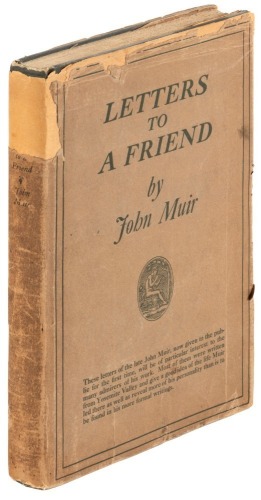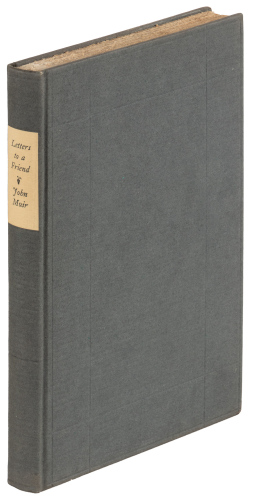Letters to his friend and translator Emile Zola 1892-1902 ZOLA, Émile (1840-1902). A group of 59 autograph letters signed (largely as "Émile Zola," with one "Émile Z" and a few initialed "É" or "Z") and two autograph letters (unsigned) to Ernest Vizetelly, together with four business cards, an autograph manuscript of responses to a questionnaire, one autograph envelope and 39 original photographs of Émile Zola taken during his stay in England. Paris, Medan, Monaco, and London, 1892-1902. In French. 103 pages, with letters, photographs, and documents mounted in a folio volume (328 x 242 mm), bound in red morocco by Riviere & Son. An important group of letters from Émile Zola to his translator and friend Ernest Vizetelly, son of Henry Vizetelly, who was the first translator of his works. Over almost ten years and across a hundred handwritten pages, Zola discusses the publications and translations of his works, the reception and specificities of the English public, his visit to London for the congress of specialists in 1893, his London exile at the publication of J'Accuse, and the trial that followed. Zola sends his manuscripts to Vizetelly, who takes on the role of agent, seeing to contracts, both with newspapers for the publication of serials and for the publication of translations. Though Zola repeatedly says that he is not concerned with money, he nonetheless has his contract requirements. He trusts his friend entirely for his business in England, but when American publishers are interested in the translations of his works, negotiations seem tense at times: "As for the American affair, I will tell you that the house Macmillan hurt me by his attitude at the time to Fécondité, and I don't see why I will continue to interact with people of such a mind." He finally chose Doubleday, noting that he received "1990 fr. 60 cent., for my part of copyright on your translation of Fécondité, that the Doubleday house has just published in New York". He is also concerned about the reception of his works in England. On Docteur Pascal: "I'm going to get into Docteur Pascal, which has nothing to do with Lourdes. It's an intimate, passionate novel […] It is to be the last volume of the Rougon-Macquart series. […] You can try to place the English translation in London. It will not offend the modesty of your compatriots." A little later, he even authorizes his translator to modify "the passages which would seem worrying to you." He reiterates this authorization regarding the translation of Travail: "Travail will not frighten English modesty. It is at most if, in a single scene, a little lively, you will have to extinguish the colors of the painting." He also assures his friend that Lourdes, which Vizetelly cannot sell to a newspaper, is not a "work of Catholic discussion" and that "the book can be put in the hands of young girls." England, despite a little mockery, is also important to Zola. He discovered it at the journalists' conference to which he was invited in 1893. He seemed rather anxious about the reception that the English press could give him: "I would like to know the importance of this congress, and whether it will offer a great interest. You know my situation in London: I am still very much discussed, almost denied, and it seems to me that [...] the words I could say there would erase a lot of the misunderstanding." Zola's doubts would finally be unfounded and he returned from London delighted with the reception he received there and with the charm and immensity of the city. At the end of the collection are 39 original photographs, probably taken by Zola at the time of his visit to London in 1893. Most of them bear indications of the places photographed on the back. Following the publication of J'Accuse and the trial which forced him into exile, Zola chooses London. He discreetly mentions the piece which appeared in l’Aurore, explaining to Vizetelly the delay in the publication of Paris on January 25, 1898: "Tell Mr. Chatto that we
Letters to his friend and translator Emile Zola 1892-1902 ZOLA, Émile (1840-1902). A group of 59 autograph letters signed (largely as "Émile Zola," with one "Émile Z" and a few initialed "É" or "Z") and two autograph letters (unsigned) to Ernest Vizetelly, together with four business cards, an autograph manuscript of responses to a questionnaire, one autograph envelope and 39 original photographs of Émile Zola taken during his stay in England. Paris, Medan, Monaco, and London, 1892-1902. In French. 103 pages, with letters, photographs, and documents mounted in a folio volume (328 x 242 mm), bound in red morocco by Riviere & Son. An important group of letters from Émile Zola to his translator and friend Ernest Vizetelly, son of Henry Vizetelly, who was the first translator of his works. Over almost ten years and across a hundred handwritten pages, Zola discusses the publications and translations of his works, the reception and specificities of the English public, his visit to London for the congress of specialists in 1893, his London exile at the publication of J'Accuse, and the trial that followed. Zola sends his manuscripts to Vizetelly, who takes on the role of agent, seeing to contracts, both with newspapers for the publication of serials and for the publication of translations. Though Zola repeatedly says that he is not concerned with money, he nonetheless has his contract requirements. He trusts his friend entirely for his business in England, but when American publishers are interested in the translations of his works, negotiations seem tense at times: "As for the American affair, I will tell you that the house Macmillan hurt me by his attitude at the time to Fécondité, and I don't see why I will continue to interact with people of such a mind." He finally chose Doubleday, noting that he received "1990 fr. 60 cent., for my part of copyright on your translation of Fécondité, that the Doubleday house has just published in New York". He is also concerned about the reception of his works in England. On Docteur Pascal: "I'm going to get into Docteur Pascal, which has nothing to do with Lourdes. It's an intimate, passionate novel […] It is to be the last volume of the Rougon-Macquart series. […] You can try to place the English translation in London. It will not offend the modesty of your compatriots." A little later, he even authorizes his translator to modify "the passages which would seem worrying to you." He reiterates this authorization regarding the translation of Travail: "Travail will not frighten English modesty. It is at most if, in a single scene, a little lively, you will have to extinguish the colors of the painting." He also assures his friend that Lourdes, which Vizetelly cannot sell to a newspaper, is not a "work of Catholic discussion" and that "the book can be put in the hands of young girls." England, despite a little mockery, is also important to Zola. He discovered it at the journalists' conference to which he was invited in 1893. He seemed rather anxious about the reception that the English press could give him: "I would like to know the importance of this congress, and whether it will offer a great interest. You know my situation in London: I am still very much discussed, almost denied, and it seems to me that [...] the words I could say there would erase a lot of the misunderstanding." Zola's doubts would finally be unfounded and he returned from London delighted with the reception he received there and with the charm and immensity of the city. At the end of the collection are 39 original photographs, probably taken by Zola at the time of his visit to London in 1893. Most of them bear indications of the places photographed on the back. Following the publication of J'Accuse and the trial which forced him into exile, Zola chooses London. He discreetly mentions the piece which appeared in l’Aurore, explaining to Vizetelly the delay in the publication of Paris on January 25, 1898: "Tell Mr. Chatto that we
.jpg)




.jpg)









Testen Sie LotSearch und seine Premium-Features 7 Tage - ohne Kosten!
Lassen Sie sich automatisch über neue Objekte in kommenden Auktionen benachrichtigen.
Suchauftrag anlegen